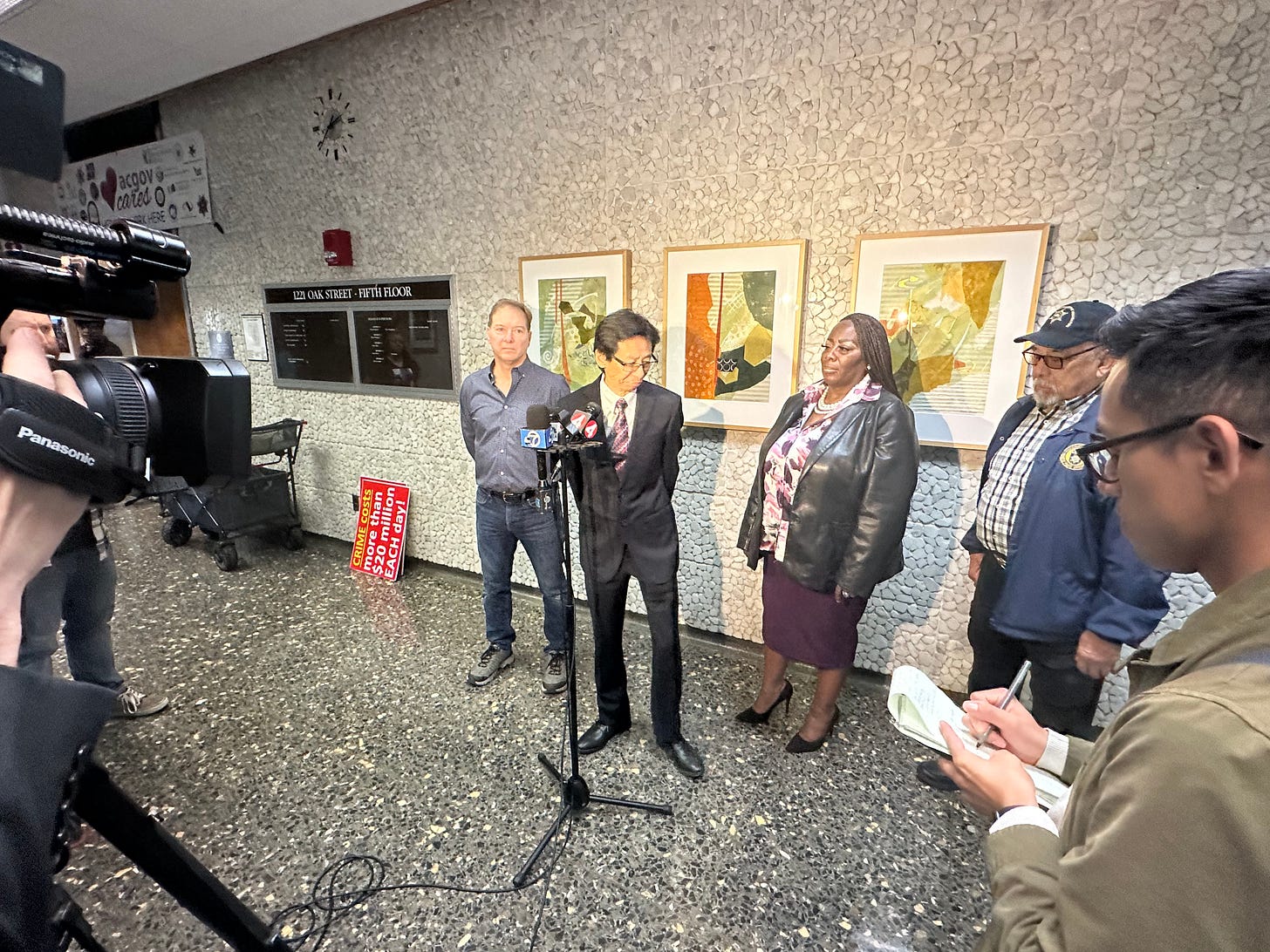ELECTION 2024
557 days to Election Day
WINNERS
The Recallers: Successful recalls are extremely rare. Just getting the recall question on the ballot in Alameda County is a feat in itself. Yet, four elected officials in Alameda County were recalled from office since July. The successful recalls against two Sunol Glen school boardmembers last summer was led by local residents and teachers’ unions. But the historic recalls of Alameda County District Attorney Pamela Price and Oakland Mayor Sheng Thao was led by a group of plucky political neophytes that doggedly kept the street heat on both beleaguered officials. Of course, they also had deep pockets funding their efforts, but money doesn’t always translate into victory. Brenda Grisham, Carl Chan, Chris Moore, Tuan Ngo, Edward Escobar, along with Brenda Harbin-Forte and Seneca Scott, and countless others provided voters the option for a course correction, and more than 60 percent of voters in both cases unceremoniously booted Price and Thao from office in stunning fashion. As for the future of recalls in the East Bay? It remains to be seen if the Price and Thao recalls was merely a perfect storm of outrage about public safety, monied interests, and incompetent elected officials.

Asian American political power: Long a growing, sleeping giant in the Tri-Valley and Tri-Cities, flexed its muscles at the ballot box this November. Sherry Hu became Dublin’s first Asian American mayor. Yajing Zhang joins the Fremont City Council, and Raymond Liu appears headed to a narrow victory in the District 6 race. Fremont also elected Raj Salwan, the minority-majority city’s first Indian American mayor. Four of Fremont’s seven councilmembers will be of Asian or South Asian ancestry. Nikki Fortunato Bas’ win in the Alameda County Supervisorial race gives the Board of Supervisors a second Asian American member. Also, don’t forget the heavy groundwork for the historically successful recall of Alameda County District Attorney Pamela Price was laid by Asian Americans in Oakland, led by Carl Chan. Along with Brenda Grisham, the unlikely pair meticulously knitted together a coalition of Asian American and African American stakeholders, two groups that often do not engage with each other. Unless merely a fleeting moment in race relations, replicating this formula for other issues plaguing the region is an exciting new development in our local politics.
Nikki Fortunato Bas: Although for most of the past two weeks following Election Day it wasn’t apparent, Bas ultimately became perhaps the biggest winner in the entire East Bay election. Oakland is in a truly historic fiscal mess and its next mayor and city council will face career-defining decisions over the next few months. Bas will not preside over Oakland’s reckoning. Instead, through pluck and an opponent who failed to strongly forge a link between her handling of Oakland’s problems, Bas won one of the county’s plum positions. She may have also avoided a potential recall campaign that was already brewing if she had lost the supervisorial race.
Corporate interests: Housing providers and special interests had a banner election year, following up several big wins in the March Primary, and a slew of knockouts in the November election, including the pair of recalls, and almost grabbed another seat on the Alameda County Board of Supervisors with John Bauters. Corporate-backed state Senate candidates Jesse Arreguín and Tim Grayson cruised to victory on the backs of special interest money and independent expenditure committees funded by the same groups. Labor unions and the Alameda County Democratic Party made little effort to stop them, despite facing off with the same corporate interests in legislative races two years ago featuring labor-backed candidates Aisha Wahab and Liz Ortega.
Winning for losing: There are deep fissures in our politics that were widened by the pandemic. These November election winners don’t have much time to celebrate before very serious decisions need to be made in their cities, districts, and jurisdictions. Zac Unger, Ken Houston, and Rowena Brown will be immediately thrust into Oakland’s cauldron of dysfunction on Day 1 with fiscal disaster possibly around the corner. BART’s new directors—Barnali Ghosh, Melissa Hernandez, and Victor Flores—face similar financial headwinds, inheriting a transit agency beset with enormous budgetary questions worsened by public perceptions about its safety and cleanliness.
LOSERS
Price and Thao: Pretty obvious. A more precipitous fall from grace may have never been seen in the history of this county, and it happened twice in one election. Price lost her grasp on the DA’s office for the same reason she gained it—immutable orthodoxy. Price won the DA’s race in 2022 because she offered an unbelievably consistent message of reform. She was recalled because she was incapable of veering off script when violent crimes blanketed television and social media. Instead of riding the wave, Price’s zealotry for radical criminal justice reform sought to ram her boat through the tsunami. As for Thao, she came into office unprepared and never showed any interest in learning on the job. Thao got caught in Price’s dragnet and never wiggled free. Along the way, violent crime and her administration’s missteps dug Thao a deeper hole. Gearing up for the recall election about six weeks before Election Day also didn’t help her chances.
Progressive movement: History may show the recall of DA Pamela Price was a major data point leading the East Bay’s slow-moving shift to the center. Most people agreed in principle with Price’s call for criminal justice reform, even as they voted to recall her from office. Electing Price two years ago was a big risk for Alameda County voters and now they have egg on their face. Coupled with the defunct Defund the Police movement, East Bay voters will likely be reticent about electing candidates they believe are too progressive. Pushing through progressive issues at the county and city-level might become more difficult. The movement is at an inflection point similar to the end of the Great Recession more than a decade ago when public employee unions were unjustly labeled as greedy civil servants sucking the city treasury dry.
Alameda County Democratic Central Committee: This group proved to be excessively out of touch with Alameda County voters. The far-left shift at the central committee and wild antics at their monthly meetings elicited a call to arms to bring the adults back in the room. A large number of liberal and moderate candidates were swept into office in the March Primary, and will take their seats in January. Alameda County Democrats were the first to officially oppose the recall of DA Pamela Price, but were unable to stop the effort. They were similarly impudent to stop the recall of Sheng Thao. The common refrain for national Democrats is they have forgotten how to talk to working class people. The Alameda County Democratic Party has the same problem. Instead of focusing on issues that affect regular people, like workers, renters, and the unhoused, for example, they instead have a narrow focus on personal grievances, identity politics, and nothing more.
Underperforming candidates: There’s still quite a bit of head-scratching about LeRonne Armstrong’s defeat in the Oakland City Council at-large race. One early clue was his relatively poor fundraising numbers. He was the candidate with the highest name-ID in the city and was the victim of the unpopular mayor’s negligence. San Leandro City Council candidate Ed Hernandez faced an error-prone incumbent, but shied away from highlighting his opponent’s negatives. The lack of a narrative, a very common problem in East Bay campaigns, hampered other candidates who underperformed, like Jean Josey in Dublin, Vinnie Bacon in Fremont, Sophie Hahn and Kate Harrison in Berkeley, and Teresa Cox in Fremont.






